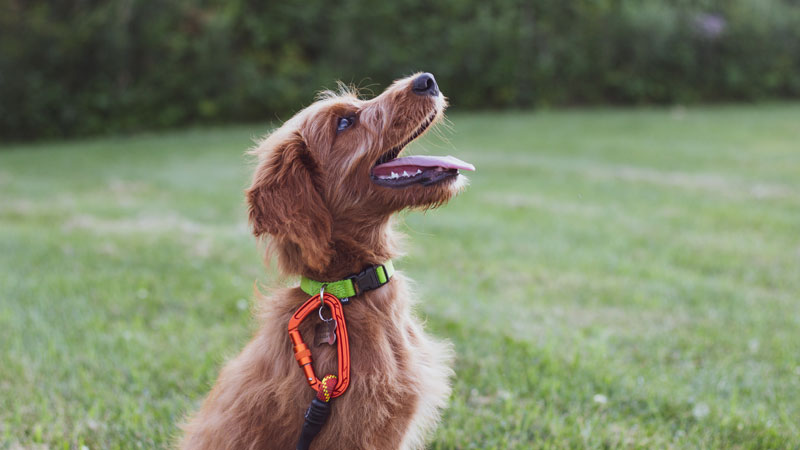- Size
- Smallest
- Small
- Small to Medium
- Medium
- Large
- Giant
- Characteristics
- Smartest
- Hypoallergenic
- Fluffy
- Best Guard
- Best Family
- Best for Kids
- Low Shedding
- Healthiest
- Police Dogs
- Most Calm
- Quietest
- Color
- White
- Black
- Grey
- Brown
- Blue
- Red
- Coat
- Hairless
- Short
- Long
- Origin
- Japan
- China
- Australia
- Germany
- Italy
- United States
- France
- Group
- Hound
- Terrier
- Herding
- Toy
- Working
- Sporting
Teaching Your Dog How to Back Up: Step-by-Step Guide

Photo by Reed Shepherd on Unsplash
Training your dog is not just about teaching tricks like sitting or shaking hands. It's also important to teach them practical skills that can help keep them safe and out of harm's way. One such skill is teaching your dog how to back up. This simple command can be incredibly useful in a variety of situations and can even save their life in certain scenarios. In this article, we will discuss the importance of teaching your dog how to back up and provide you with a step-by-step guide on how to train them.
Why Teach Your Dog How to Back Up?
1. Safety
Teaching your dog how to back up can be a great safety measure. For example, if your dog is approaching something dangerous or unfamiliar, you can use the back up command to keep them at a safe distance. This can include situations like approaching a busy road or getting too close to an aggressive dog. By teaching them how to back up on command, you have a way to quickly move them out of harm's way.
2. Maneuverability
Back up is also a helpful command when it comes to maneuverability. Whether you're in a crowded space or need your dog to move out of the way for another person or object, knowing how to back up can make these situations much easier to handle. It can also be beneficial when you're trying to navigate through narrow spaces like doorways or staircases.
3. Obedience and Communication
Teaching your dog how to back up is a training exercise that strengthens their obedience and communication skills. As your dog learns this command, they will become more attentive to your cues and signals. This will improve their overall behavior and make it easier for you to communicate your expectations to them in other situations as well.
Step-by-Step Guide to Teaching Your Dog How to Back Up
Before you begin training your dog to back up, make sure you have a quiet and distraction-free space to work in. Follow these steps to train your dog effectively:
Step 1: Start with a solid "Stay" command
Before asking your dog to back up, they should have a solid understanding of the "Stay" command. This will help keep them in place while you give the back up command. Practice the "Stay" command until your dog can hold the position reliably.
Step 2: Get your dog's attention
Once your dog is in the "Stay" position, get their attention using their favorite treat or toy. Hold it in front of their nose to get them focused on it.
Step 3: Move backward
Begin moving slowly backward, away from your dog. Your dog may naturally follow you. If they do, reward them with positive reinforcement and praise. Repeat this step several times until your dog starts to understand that moving backward is what you want them to do.
Step 4: Add a verbal cue
Incorporate a verbal cue, such as "Back up," as you move backward. Repeat this cue each time you practice the exercise. Eventually, your dog will associate the verbal cue with the action of moving backward.
Step 5: Increase the distance
Gradually increase the distance you move backward during each repetition. This will reinforce the concept of moving backward. Remember to reward your dog every time they successfully back up.
Step 6: Eliminate physical prompts
As your dog becomes more comfortable with the command, eliminate any physical prompts, such as holding a treat or toy in front of their nose. They should be able to understand and respond to the verbal cue alone.
Step 7: Practice in different environments
Once your dog has mastered the back up command in a controlled environment, start practicing in different environments with varying levels of distractions. This will help ensure that your dog can respond to the command in any situation.
Step 8: Reinforce and maintain the behavior
Consistency is key in training your dog. Continuously reinforce the back up command by practicing it regularly and rewarding your dog for their successful response. Regular reinforcement will help maintain the behavior over time.
Troubleshooting Common Challenges
1. Lack of Interest or Distraction:
Variety in Training: Keep training sessions interesting by incorporating a variety of commands and activities. This prevents boredom and maintains your dog's engagement.
Adjusting Environment: If your dog seems disinterested, adjust the training environment. Experiment with different locations to find the setting where your dog is most responsive.
2. Slow Progress:
Patience is Key: Learning new commands takes time, and progress may be slow. Be patient, and celebrate small achievements to motivate your dog.
Consistent Reinforcement: Ensure consistent reinforcement with treats and praise to reinforce the behavior positively.
3. Lack of Coordination:
Simplify Movements: If your dog struggles with coordination, simplify the movement initially. Gradually increase the complexity as they become more comfortable.
Encourage Playfulness: Make the training sessions playful. Incorporate play into the back-up command, turning it into a fun and interactive game.
Conclusion
Teaching your dog how to back up is an essential skill that can greatly benefit their safety, maneuverability, obedience, and overall communication. By following the step-by-step guide provided in this article, you can train your dog to back up reliably in any situation. Remember, patience and consistency are key in training, so be sure to practice regularly and provide positive reinforcement for your dog's efforts.
You May Also Like
 Dog Training TipsTrain Your Dog to Roll Over: A Step-by-Step Guide
Dog Training TipsTrain Your Dog to Roll Over: A Step-by-Step Guide Dog Training TipsTeaching Your Dog the "Sitting Pretty" or "Beg" Trick
Dog Training TipsTeaching Your Dog the "Sitting Pretty" or "Beg" Trick Dog Training TipsTraining Your Dog to Spin: A Step-by-Step Guide
Dog Training TipsTraining Your Dog to Spin: A Step-by-Step Guide Dog Training TipsTeaching Your Dog to Wave Goodbye: A Step-by-Step Guide
Dog Training TipsTeaching Your Dog to Wave Goodbye: A Step-by-Step Guide Dog Training TipsTeaching Your Dog the Classic Trick: Shake Hands
Dog Training TipsTeaching Your Dog the Classic Trick: Shake Hands Help & AdviceTraining Your Dog to Give Kisses: A Step-by-Step Guide
Help & AdviceTraining Your Dog to Give Kisses: A Step-by-Step Guide